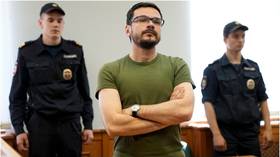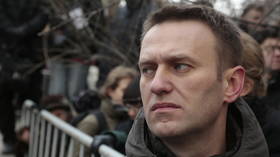Opposition figure faces jail for ‘fakes’ about Russian military

Elected Moscow city official and opposition figure Ilya Yashin has been officially charged with public dissemination of false information about the activities of the Russian military, the politician’s lawyer, Maria Eismont, told RIA Novosti on Wednesday. Yashin denies any wrongdoing, she added.
The authorities have requested that Yashin be detained for two months, the joint press service of the Moscow court system said.
Later on Wednesday, Moscow’s Basmanny District Court agreed to the prosecutors' request and ruled that Yashin would be kept in custody until September 12.
Yashin is suspected of violating Article 207.3 of Russia’s Criminal Code, which bans “publicly and knowingly disseminating false information” about Russia’s military “under the guise of reliable reports.” If found guilty, he could face up to 10 years in jail.
Earlier, it was reported that the politician’s home in Moscow had been searched by police.
He was elected to the local government in Moscow’s Krasnoselsky District in 2017.
Yashin had just finished serving a 15-day administrative arrest, which stemmed from an unrelated incident in Moscow last month and was due to be released on Wednesday. According to police, Yashin had refused to comply with a document check in a public park in June and scuffled with officers.
He denied that the scuffle took place and claimed that the charges against him were politically motivated. “I’m not crazy to start a fight with three police officers,” he wrote on his Telegram channel at the time.
Article 207.3, which deals with the spreading of falsehoods about the Russian Armed Forces, was added to the Criminal Code shortly after Russia launched its military operation in Ukraine in late February.
According to his lawyer Vadim Prokhorov, Yashin was charged over the comments he made on his channel in YouTube in April about the events in Bucha, a city near Kiev. Ukraine, Western governments and human rights groups accused Russian troops of committing atrocities while in the city in March. Moscow has repeatedly denied these claims.
Last week, another elected official in the Krasnoselsky District, Alexey Gorinov, was sentenced to seven years in jail after being convicted of spreading falsehoods about the Russian military.
Russia sent troops into Ukraine on February 24, citing Kiev’s failure to implement the Minsk agreements, designed to give the regions of Donetsk and Lugansk special status within the Ukrainian state. The protocols, brokered by Germany and France, were first signed in 2014. Former Ukrainian President Petro Poroshenko has since admitted that Kiev’s main goal was to use the ceasefire to buy time and “create powerful armed forces.”
In February 2022, the Kremlin recognized the Donbass republics as independent states and demanded that Ukraine officially declare itself a neutral country that will never join any Western military bloc. Kiev insists the Russian offensive was completely unprovoked.













